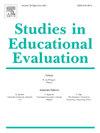学生对同伴反馈的信念和取向能否预测同伴反馈的质量和感知?
IF 2.6
2区 教育学
Q1 EDUCATION & EDUCATIONAL RESEARCH
引用次数: 0
摘要
同伴反馈的有效性可能取决于对同伴反馈的信念和取向。因此,我们调查了他们在多大程度上预测了(a)学生向同龄人提供的反馈的质量和(b)他们从同龄人那里得到的反馈的感知充分性。N = 254名职前教师报告了他们的信仰和取向,提供了反馈,并处理了他们收到的反馈。回归分析表明,信念和取向与所提供反馈的质量无关,同伴反馈作为重要技能和接受性的评价显著预测感知反馈的充分性。在提供反馈时缺乏关联可能表明同伴反馈作为教学环境可以在一定程度上提供外部支架,几乎可以消除个体对同伴反馈提供的信念差异。我们的研究结果表明,培训和指导应主要侧重于培养反馈接收的动机。本文章由计算机程序翻译,如有差异,请以英文原文为准。
Do students’ beliefs and orientations toward peer feedback predict peer feedback quality and perceptions?
The effectiveness of peer feedback is likely to depend on beliefs and orientations toward peer feedback. Therefore, we investigate to what extent they predict (a) the quality of the feedback that students provide to their peers and (b) the perceived adequacy of the feedback they receive from their peers. N = 254 pre-service teachers reported their beliefs and orientations, provided feedback, and processed the feedback they received. Regression analyses showed that beliefs and orientations were not associated with the quality of the provided feedback and that valuation of peer feedback as important skill and receptivity significantly predicted perceived feedback adequacy. The lack of associations when providing feedback might indicate that peer feedback as instructional context can provide external scaffolding to an extent that almost levels individual differences in beliefs towards peer feedback providing. Our results imply that training and instruction should mainly focus on fostering motivation for feedback reception.
求助全文
通过发布文献求助,成功后即可免费获取论文全文。
去求助
来源期刊

Studies in Educational Evaluation
Multiple-
CiteScore
6.90
自引率
6.50%
发文量
90
审稿时长
62 days
期刊介绍:
Studies in Educational Evaluation publishes original reports of evaluation studies. Four types of articles are published by the journal: (a) Empirical evaluation studies representing evaluation practice in educational systems around the world; (b) Theoretical reflections and empirical studies related to issues involved in the evaluation of educational programs, educational institutions, educational personnel and student assessment; (c) Articles summarizing the state-of-the-art concerning specific topics in evaluation in general or in a particular country or group of countries; (d) Book reviews and brief abstracts of evaluation studies.
 求助内容:
求助内容: 应助结果提醒方式:
应助结果提醒方式:


